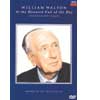William Walton - At the Haunted End of the Day
A VIVID AND CANDID DOCUMENTARY ABOUT WILLIAM WALTON‚ MADE NEAR THE END OF HIS LIFE
View record and artist detailsRecord and Artist Details
Genre:
DVD
Label: Decca
Magazine Review Date: 5/2002
Media Format: Digital Versatile Disc
Media Runtime: 99
Mastering:
Stereo
Catalogue Number: 074 150-9DH

Author:
This extended television profile of William Walton by Tony Palmer‚ winner of the Italia Prize‚ is among the most moving ever made of a composer and makes a very welcome commercial appearance on DVD. Turned down by the BBC‚ it was shown on ‘The South Bank Show’ on ITV‚ thanks both to Michael Grade and Melvyn Bragg. For once‚ they made their schedules cope with a programme an hour and 40 minutes long – a length fully justified. The approach is both direct and evocative‚ starting with Walton himself nearing 80 and plainly rather frail musing at the keyboard of the piano in his work room‚ as he composes the solo cello Passacaglia for Rostropovich‚ one of his very last works.
That brings several of the wrily humorous obiter dicta from him with which the film is delightfully dotted‚ prompting also an immediate and heartfelt tribute to both the man and his music from Laurence Olivier‚ for whom he wrote his finest film music. As Walton explains‚ only latterly had he turned to composing at the piano‚ but as he was no pianist‚ that ‘has rather boogered the whole thing oop’ – for a moment resorting to the Lancashire accent he promptly dropped when‚ as a boy treble‚ he joined the choir of Christ Church Cathedral‚ Oxford.
The story of his career‚ with its extraordinary sequence of lucky breaks‚ is then told for the most part chronologically. It was‚ after all‚ amazing that a boy from an ordinary‚ rather poor home in Oldham should emerge when barely 20 as the darling of avantgarde artistic society in London in the 1920s. We see the house where he was born‚ by Oldham standards relatively grand if‚ as he says‚ with an outside loo‚ and evocative shots follow of Oldham (including the ‘very rough’ board school he attended and his church)‚ Oxford‚ and later London and Amalfi in Italy. His determination never to go back to Oldham is emphasised throughout‚ even though in the 1920s‚ with his love of the highlife‚ it meant he had to be a ‘scrounger’‚ despite the help of the Sitwells and others.
The impact of Belshazzar’s Feast is fully brought out‚ not least thanks to Simon Rattle’s conducting of excerpts in his first major television contribution‚ though Walton himself dismisses the very first performance in Leeds in 1931 as ‘pretty bloody’. Later‚ Rattle also directs the passages from the First Symphony‚ which comes into the story not in its proper place in the 1930s‚ but in a sequence on the loves of his life‚ when he is safely married to Susana and living comfortably on the isle of Ischia.
The film was made within a couple of years of Walton’s death in 1983‚ and reflects in places his melancholy thoughts on death and how little he felt he had achieved. That vein of melancholy running through his work‚ as Palmer infers‚ was the reason he gave the film its title – taken from one of the most striking of the arias in his opera Troilus and Cressida. Even so‚ the impact of the film is anything but depressing‚ with the effervescent personality of Susana taking over towards the end who‚ as she says‚ ‘was produced specially to take care of William’. A unique career‚ vividly recreated.
Discover the world's largest classical music catalogue with Presto Music.

Gramophone Digital Club
- Digital Edition
- Digital Archive
- Reviews Database
- Full website access
From £8.75 / month
Subscribe
Gramophone Full Club
- Print Edition
- Digital Edition
- Digital Archive
- Reviews Database
- Full website access
From £11.00 / month
Subscribe
If you are a library, university or other organisation that would be interested in an institutional subscription to Gramophone please click here for further information.





